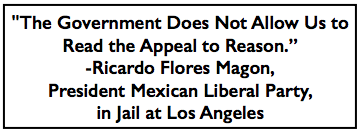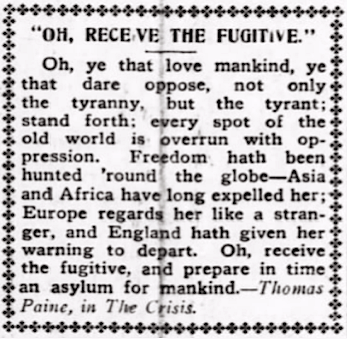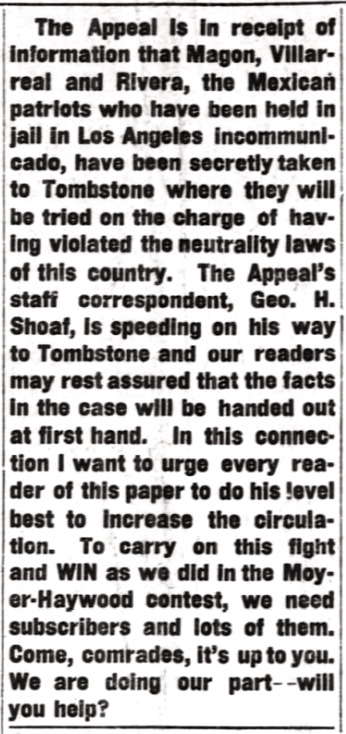 ———-
———-
Hellraisers Journal – Monday March 15, 1909
Eugene Debs and Fred Warren Travel to Leavenworth, Visit Mexican Comrade
From the Appeal to Reason of March 13, 1909:
With Araujo in Prison
BY EUGENE V. DEBS.
Returning from Texas whither he had hastened to ascertain the true facts in the Araujo case, the managing editor of the Appeal, Fred D. Warren, was up in arms, declaring the affair a monstrous injustice and his determination to aid the convicted Mexican by all the means in his power. This determination was made stronger by the connection he discerned between the case and the cases pending in Arizona with which Appeal readers are familiar and by its important bearing upon the whole question of the war in Mexico.
For, be it understood, the war in Mexico has begun. The despotism of assassination has done its worst and at last the people have revolted, for which thank God!
In this Mexican war the working class of the United States is deeply and vitally interested, whether it knows it or not.
In Mexico fourteen million working people are in peon slavery. Their wages, in American money, will not average 25 cents a day.
American capitalists virtually own these millions of slaves and grind out their lives to amass fortunes to squander upon syphilitic parasites. These American capitalists, in collusion with Diaz, the despot, have taken possession of Mexico. Millions upon millions of wealth are in sight. Diaz and his government-government by assassination-keep down the slaves. No labor leaders there. They are shot. Strikers are hanged and agitators waylaid and assassinated.
The Mexican government is the slave herder of the American capitalists. Diaz is the chief herder in the service of Rockefeller, Morgan, Harriman and other American plutocrats who own Mexico.
These fourteen million Mexican slaves are the competitors of American wage-workers. From now on the industrial development will be shifted to Mexico, the land of marvelous resources, and peon slaves will be employed at 15 cents a day while American workingmen walk the streets and starve by the wayside. The Mexican war is the war of peon slaves against peon slavery. These slaves are fighting the battles of American wage workers.
Will American wage workers see this and fight the battles of the peons and thereby fight for their own freedom?
Araujo is a compatriot of Magon-one of the leaders in the revolt of the slaves. Driven from Mexico he came to the United States. Escaping Dias he found Roosevelt and Bonaparte. He soon realized that American capitalists are the masters of both republics. He was seized on a trumped-up charge, tried before a friend of Diaz-and sentenced to a long term in federal prison, one of Uncle Sam’s hospitable retreats for the sons of the refugees he used to entertain at the white house.
This, in brief, is the story of Antonio Araujo, the Mexican lad of 26, who is destined to make important history in two countries.
* * *
This case appealed to us from the moment we heard of it and that was when Araujo’s letter, announcing his sentence was first received. The papers had not a word of it. Warren’s trip to Texas speedily followed. Tho see Araujo himself was next in order and Warren and the writer were soon enroute to Leavenworth. Arriving there we were cordially received by Warden McLaughry of the federal prison, who, for sixteen years, was warden at Joliet and who has done more for prison reform and the humane treatment of prisoners than any other man in the United States.
Araujo is fortunate in this respect at least, that he is in the most comfortable prison in the country.
But it is still a prison, and a prison’s a prison for a’ that.
Warden McLaughry invited us into his private office, rang a little bell on his desk and when the attendant appeared, said “Have Mr. Araujo come, and tell him some friends wish to see him.”
Five minutes later Araujo stepped in. A mere slip of a boy, he surprised us. He was neatly dressed in a suit of gray (here there are no prison stripes and no shorn heads). The frank ingenuous countenance looked troubled for a moment-and no wonder. For months he had been as a hare ahead of the hounds. What was he now to face?
And then a sudden light overspread his features. It all occurred in an instant. He recognized us and his very soul beamed from his dark and expressive eyes. He put his arms about us, first one and then the other. His face was a study. Overcome by his emotions he could not speak. But there was a world of utterance in his fine eyes and his clear-cut and mobile features.
Araujo and Warren held each other in fast embrace. They looked into each other’s eyes but said nothing. COMRADES! I had never before realized its full meaning. How beautiful, how elevating and how suggestive!
Warden McLaughry’s eyes filled and he turned away. Every chord within me thrilled with emotions of mingled pain and joy.
This living picture held my rapt attention.
International solidarity was here incarnate. A few days before, this Mexican boy and this American youth, but a trifle older, had never seen, nor even heard of each other. Now they were joined together in the bonds of indissoluble comradeship.
Araujo, the Mexican editor, and Warren, the American editor, are one in the international movement. Araujo is sentenced and Warren is under indictment. They are comrades in the social revolution. Is it strange that they embraced spontaneously and are now united as by hooks of steel?
Araujo expressed his gratitude that he had such loyal comrades and Warren assured him that he was willing to share his imprisonment.
The story of Araujo was soon told. It is substantially as it has already appeared in these columns. To see Araujo is to believe him. He is incapable of deception. He has all the attributes of a frank, candid, manly young man. He is brave as he is gentle, and fearless as he is incorruptible.
This noble youth is in the penitentiary because of his virtues. He will one day be known as a patriot and emancipator.
Bravely fighting for the unfortunate peons of his country he is fighting at the same time the battles of the working class of the United States.
Will the wage-slaves realize this and give to this brave boy and his colleagues who are soon to be tried in Arizona their united support? If they fail in their duty to the Mexican comrades they will betray their own cause and dearly will they pay for it. But they will not fail!
Upon our return to Girard, Wayland said to us:
You have done a great days’s work. Araujo now knows that his American comrades will do their duty. The Appeal has to make the fight of its life and before it is over it may also be a fight for its life!
Comrades, friends and fellow-citizens of America, these patriots have been convicted because of our cowardly indifference and inexcusable apathy.
We are bound by every tie of our class and by every consideration of duty to right the wrong done these men. Let us organize our forces and press the fight. When the united voice of labor is heard in protest the prison doors will open and justice will be done.
———-
[…..]
Funds for Defense.
Funds for the legal defense of our Mexican comrades may be sent to Jane Addams, Hull House, Chicago, treasurer of the Political Refugee Defense League, or to Ernest Mills, secretary-treasurer W. F. M., Denver, Colorado. The Appeal urges its readers to take up this very necessary work of raising funds at once. Go to your unions and ask for a donation-circulate a subscription list among your friends. The defense will need funds and at once.
———-
[Emphasis added.]
~~~~~~~~~~~~~~~~~~~~~~
SOUCE & IMAGES
Appeal to Reason
(Girard, Kansas)
-Mar 13, 1909
https://www.newspapers.com/image/66981725/
See also:
Tag: Mexican Revolutionaries
https://weneverforget.org/tag/mexican-revolutionaries/
Tag: Antonio de Pio Araujo
https://weneverforget.org/tag/antonio-de-pio-araujo/
Gentle Rebel: Letters of Eugene V. Debs
-ed by J. Robert Constantine
University of Illinois Press, 1995
(search: “march 7, 1909”)
https://books.google.com/books?id=P3Sse5ftltoC
“The Fighting Editor”
or “Warren and the Appeal”
-by George D. Brewer
Girard, Kansas, 1910
https://archive.org/details/thefightingedito00brewuoft/page/n8
~~~~~~~~~~~~~~~~~~~~~~~~~~~~~~~~~~~~~~~~~~~~~


